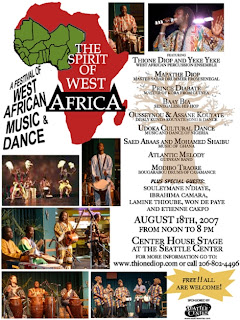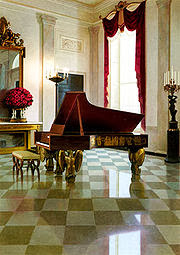Griot Spirits Spin at the Center of Seattle
poster from http://www.thionediop.com
Spirit of West Africa
Seattle Center
Seattle, Washington
August 18, 2007
I had one of those weeks where everywhere I turned I ran into some kind of roadblock--from my professional life to my personal one. So by the time the weekend rolled around, I was prepared to witness some first-rate West African music. I headed to the Spirit of West Africa event held at Seattle Center.
When I first arrived, the Center House seemed sparse of African music aficionadas and a few tourists were milling about. By the time, Guinean griot Prince Diabatè hit the stage and his cora vibrated throughout the cavernous space, onlookers crept up to get a closer look. Eventually members of Seattle's West African community, and African music aficionadas began filling the seats, and they were very much aware of the fact that they were in the midst of an international performer, associated with the Malian legend, Salif Keita, (who produced one of Diabatè's albums).
The West African harp (cora), in a players hands can sooth tired nerves, relax the soul and fill the heart with joy. In a master's hands, that same instrument can lead to a transcendental experience, which I felt while witnessing Diabatè's performance. But for the life of me, I could not figure out how he was able to drum on his cora and of course, watching the musician dance around stage while playing the intricate instrument also amazed me.
Next up was the event organizer and master djembe player, Thione Diop with his drum ensemble, Yeke Yeke. The women sitting next to me cited that Diop is the fasted drummer in the world. I had seen him perform before at the Northwest Folklife Festival several years ago and though his playing certainly got my pulse racing, I had no idea that he possessed such a moniker. I wouldn't know the fastest drummer in the world even he stared me in the face since I know little about drumming finesse. However, Diop exudes charisma and power as a musician. He also emits a friendliness, which is why so many people sitting in the audience could be counted among his friends and colleagues.
The "fastest drummer in the world" wowed the crowd with an electrifying ensemble performance. Then, if that wasn't enough, he invited his first surprise guest on stage, a master drummer from Angèlique Kidjo's band (who also happened to be in Seattle for the weekend). The performance grew hotter by the moment, with children dancing in a frenzy near the stage and eventually, African women strutting their stuff too. And I love watching West African women in their traditional clothing dance with flashes of vibrant colors swirling about and their bodies defying gravity.
Momentum picked up as more musical guests came on stage, this time, twin brothers from Senegal, Assane and Ousseynou Kouyate who sang Malian songs. Although most of the musicians hailed from Senegal and Diabatè from Guinea, the twin brothers' singing, recalled Malian Ali Farka Toure's desert blues. And later, they recalled Malian singer, Django, with their throaty soaring vocals. However, their vibrant acrobatic dancing stole the show. I only wish that I had the perfect poetic phrase to describe the brite colored clothing the dancers wore and their athletic ability. However, anyone who has seen a West African drumming and dancing concert already knows what I am trying to describe here.
At that point, with the drummers kicking out polyrhythms, Diabatè playing the traditional kamalengoni, and the Kouyate brothers crooning sweet desert blues, I started falling into a trance. I watched children of various ethnic backgrounds, gravitate towards the power drumming, and the plucked strings of the kamalengnoni.
All I could think of was the healing qualities of this music. And how exposing children to polyphonic drumming and ancient African harp would enhance brain, not to mention heart & soul activity of those children. And I felt good too with all my troubles melting away into total bliss. I felt like a small child regaining my lost innocence. I felt something rare in my overstressed adult life--I felt gleeful.
Senegalese Master Sabar drummer Mapathe Diop, Senegalese hip-hop artist Baay Bia, Senegalese drummer Modibo Traore (Bougarabou Drums of Casamance), and tons of special guests, both international and local rounded off the event. Unfortunately, time allowed me only to witness a fraction of these electrifying performances. I read the poster only after I returned home and regretted that I missed a performance by a local balafon player, (one of my favorite West African instruments along with talking drum).
In the end, I am glad that I left my troubles behind and allowed myself to feel those drums. I am feeling little tension and anxiety at the moment. And I am sure that I will dream sweet revelries tonight. I advice my fellow Seattlelites, next time, The Spirit of West Africa makes a free appearance at Seattle Center, be there. And if it the Spirit moves to a venue with cover charge, be there also.
African dancing and drumming can do a lot for the body and soul. I enjoy all types of music with each culture, healing some aspect of our lives. But, music from the African continent is the most grounding of music, with Native American drumming coming close behind. So if you are feeling an unintended out-of-the-body experience, having trouble focusing, or staying in the present moment, listen to African drumming. The Spirit of Africa might just be calling your body to surrender to polyrhythmic beats.
photo of Prince Diabate from World Music Central




Comments
Post a Comment